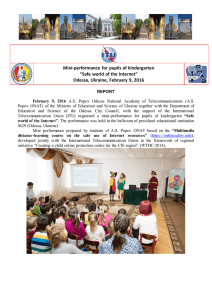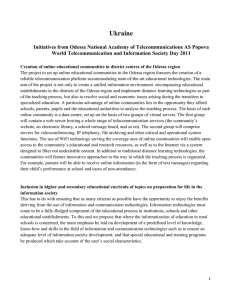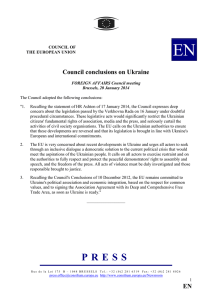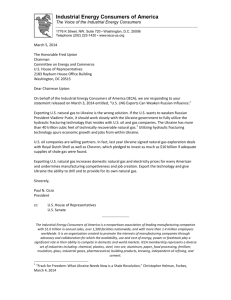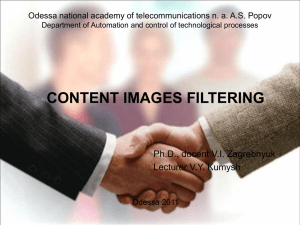General Secretariat
advertisement
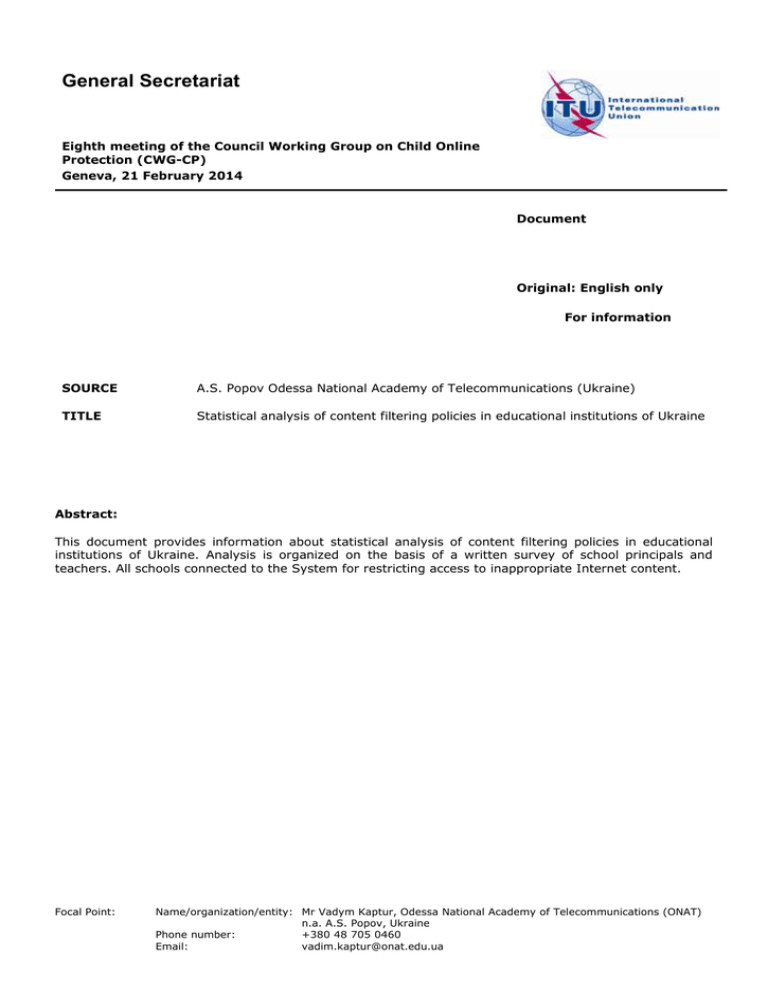
General Secretariat Eighth meeting of the Council Working Group on Child Online Protection (CWG-CP) Geneva, 21 February 2014 Document Original: English only For information SOURCE A.S. Popov Odessa National Academy of Telecommunications (Ukraine) TITLE Statistical analysis of content filtering policies in educational institutions of Ukraine Abstract: This document provides information about statistical analysis of content filtering policies in educational institutions of Ukraine. Analysis is organized on the basis of a written survey of school principals and teachers. All schools connected to the System for restricting access to inappropriate Internet content. Focal Point: Name/organization/entity: Mr Vadym Kaptur, Odessa National Academy of Telecommunications (ONAT) n.a. A.S. Popov, Ukraine Phone number: +380 48 705 0460 Email: vadim.kaptur@onat.edu.ua 1. Introduction In Ukraine (on the basis of A.S. Popov Odessa National Academy of Telecommunications) there was created a System for restricting access to inappropriate Internet content in educational institutions (schools, universities, etc.) and hostels. The main advantages of this system is the simplicity of scalability, reliability and adaptive filtering of negative content, significant reducing of the overall http-traffic due to the caching of information (reducing of the exploitation cost for access channels of educational institutions (schools, universities, etc.) and student hostels), adjustment to the emergence of new inappropriate resources. The creation of such system allowed free and safe (released from pornography and other negative information) Internet access for students living in hostels, a gratuitous area of Internet access using Wi-Fi technology in the educational institutions, etc. The basis of the principle of the proposed System is a setting of own proxy-server that has a database of inappropriate resources in each educational institution or hostel. The System covers a wide range of technical solutions (centralized and decentralized filtering, filtering through proxy-servers and the DNS-servers, etc.). For the first time the System was presented at the First meeting of the ITU Council Work Group on Child online Protection in March 2010. While connecting educational institutions to the System they were asked to complete a form which allows revealing the wishes of users about filtering the content. In particular, directors of schools, teachers of Informatics and students were asked to answer the following questions: which categories of resources you plan to restrict at your school, time limit access (24 hours a day / part time), the list of workstations on which access should not be limited, the list of resources which it is not necessary to limit etc. On the basis of the compiled questionnaires were formed filtering policies, which are used in educational institutions of Ukraine. With the purpose of analysis of these policies 94 questionnaire educational institutions from different regions of Ukraine were treated, with different number of pupils and different material base. 2. Results of analysis On Fig. 1 are shown the categories of content that (according to the survey results) should be allowed or blocked at school. As pornographic materials may cause harm to the mental health of the children, the school's management is primarily interested in blocking such kind of resources, which confirms the statistics collected. As it can be seen from Fig. 1, in all educational institutions administration wants to block the access to pornographic materials and / or erotic content. In that turn, as it can be seen from Fig. 1, such kind of content as entertainment resources is valid for half of the respondents educational institutions. It should be noted that most of these schools with computer classes can be used not only for the educational but for entertainment purposes at free time, for example in boarding schools or in small rural schools. Figure 1 - Categories of content that is blocked at schools Access to the pirated software is wished to block only by 38% of educational institutions. Most of such schools are located in major towns and are usually have in the state the person performing the duties of the system administrator. According to the data obtained (Fig. 1) only 5% of respondents of educational institutions decided to use the system content filtering only at certain times. In vast majority of such schools, the access should be restricted only during school hours. The need in unrestricted access to the Internet for those schools is caused by the presence of various extracurricular activities. It is worth noting that in schools that have decided to limit the time of the filtration system, as a rule were selected more stringent policy of blocking of content. The results of the survey about the need of exceptions from the general rules (restriction of access by the selected security policy) certain workstations are of special interest. So, 33% of educational institutions management have decided not to limit access to undesirable content categories workstations for teachers and administration of the educational institution. In some schools, it was decided to block the computers of the administration-only access to the materials of pornographic content, leaving the opportunity to view entertainment resources. This decision is explained by teachers need in access to entertainment, video and audio materials for the preparation of a variety of cultural events. In addition to the exception from the General system of restrictions individual workstations for administrations of educational institutions it was offered to allow access to certain resources, which are included into the list of blocked categories. Such necessity arose only in 13% of the educational institutions. It is noteworthy that 11% of the heads of the teachers decided not to restrict user access to social networks and only 2% of schools have decided not to restrict access to a resource YouTube. 3. Conclusions The analysis of filtering policies used in educational institutions of Ukraine demonstrated a certain divergence of approaches for blocking the entertainment content and provided the opportunity to create some basic System configuration profiles. _____________
